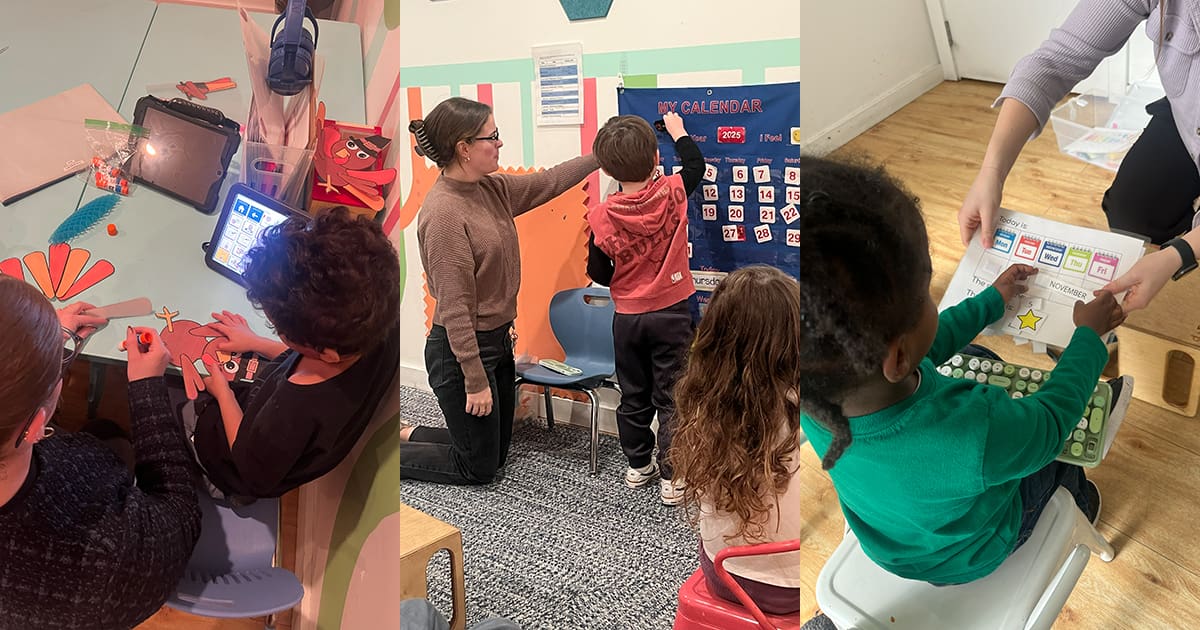Share this Post

For many children with autism, mealtime can present unique challenges. Sensory sensitivities, aversions to textures, or fear of new foods can make eating a source of stress rather than nourishment. However, food play is a fun and creative way to help children build confidence, explore new foods, and develop a positive relationship with mealtime.
At CST Academy, food play is an integral part of our approach to supporting children with autism. By turning food exploration into a playful and engaging experience, we help children overcome sensory barriers, foster curiosity, and discover the joy of trying new foods. Our expert therapists work closely with families to create personalized strategies that make mealtime more enjoyable for everyone.
What Is Food Play?
Food play involves using food as a tool for sensory exploration, creativity, and skill-building without the pressure of eating. It’s not about finishing a plate or trying a bite; instead, it’s about allowing children to interact with food in a way that feels safe, fun, and engaging.
Examples of food play activities include:
- Stacking apple slices or cucumber rounds like blocks.
- Painting with yogurt, pudding, or colorful sauces.
- Making shapes or designs with cut fruits and vegetables.
- Feeling the textures of dry pasta, rice, or beans.
- Using cookie cutters to create fun shapes from sandwiches or pancakes.
Food play turns mealtime into an opportunity for creativity and discovery, laying the groundwork for positive eating habits.
The Benefits of Food Play for Children with Autism
Food play provides numerous benefits that go beyond mealtime, supporting a child’s overall development. Here’s how food play can help children with autism:
- Reduces Mealtime Anxiety
Food play removes the pressure to eat and allows children to explore food in a relaxed, enjoyable setting. This helps reduce stress and builds a positive association with mealtime. - Encourages Sensory Exploration
Many children with autism have sensory sensitivities that affect their willingness to try new foods. Food play allows them to gradually explore textures, smells, and colors, helping them feel more comfortable with unfamiliar foods. - Improves Fine Motor Skills
Manipulating food through cutting, stacking, or stirring helps strengthen hand muscles and improve coordination, supporting fine motor development. - Promotes Curiosity About Food
By engaging with food in creative ways, children become more curious and open to trying new foods over time. - Fosters Emotional Regulation
The playful, repetitive nature of food play can have a calming effect, helping children regulate their emotions during mealtime. - Builds Social Skills
Group food play activities encourage sharing, turn-taking, and collaboration, supporting the development of social interaction skills. - Lays the Foundation for Positive Eating Habits
Food play helps children build familiarity with different foods, increasing the likelihood that they will eventually try and enjoy them.
How CST Academy Incorporates Food Play into Therapy
At CST Academy, we integrate food play into our feeding therapy programs as a powerful tool for helping children with autism overcome mealtime challenges. Here’s how we make food play part of our approach:
- Personalized Feeding Plans
Every child receives a customized plan based on their specific sensory preferences, aversions, and developmental goals. Food play activities are carefully chosen to match each child’s needs. - Sensory-Friendly Environment
Our classrooms are equipped with sensory-friendly tools and materials that create a supportive environment for food exploration. - Play-Based Feeding Therapy
Our therapists use creative, engaging food play activities to help children interact with food in a stress-free way. For example, they might use colorful fruits to make “rainbow salads” or encourage children to create edible art with sauces and vegetables. - Gradual Exposure to New Foods
Food play introduces children to new foods in a low-pressure way, helping them become familiar with different textures, smells, and appearances before trying a bite. - Parent Collaboration
We work closely with families to provide strategies and ideas for incorporating food play into mealtime at home, ensuring consistency and progress beyond therapy sessions. - Multidisciplinary Approach
Our team of occupational therapists, speech therapists, and feeding specialists collaborates to address the sensory, motor, and behavioral aspects of mealtime challenges.
Fun Food Play Activities to Try at Home
Parents can easily incorporate food play into their child’s daily routine to support sensory exploration and positive mealtime experiences. Here are some fun, simple ideas to try:
- Food Painting:
Use yogurt, pudding, or colorful purees as “paint” and let your child create art on a plate or piece of wax paper. - Edible Collages:
Provide a variety of small foods like cereal, cut fruits, or crackers for your child to arrange into fun shapes or patterns. - Pasta Play:
Offer dry pasta for stacking, sorting, or threading onto string to make necklaces. - Squish and Squeeze:
Encourage your child to mash bananas, knead dough, or squish soft fruits to explore textures. - Snack Sorting:
Use colorful snacks like fruit snacks, M&Ms, or goldfish crackers to practice sorting by color or shape. - Build Edible Towers:
Stack cucumber slices, carrot sticks, or cheese cubes to make towers or “buildings.”
Why Families Choose CST Academy
Families trust CST Academy to support their child’s development because of our expertise, compassion, and commitment to individualized care. Here’s why parents choose us:
- Expert Team: Our therapists specialize in feeding therapy, sensory integration, and child development, ensuring comprehensive care.
- Tailored Programs: Every therapy plan is personalized to meet each child’s unique needs and goals.
- Inclusive Environment: Our sensory-friendly classrooms provide a safe, welcoming space for exploration and growth.
- Parent Involvement: We partner with families to create strategies that support progress at home and in everyday life.
A Parent’s Perspective on Food Play at CST Academy
One parent shared their story:
“Before CST Academy, mealtimes were a struggle for our family. Our child refused to try new foods and became upset even at the sight of certain textures. The food play activities introduced by the therapists made such a difference. Now, our child is excited to explore new foods and even tries tasting them occasionally. It’s been a transformative experience for all of us.”
Take the Next Step with CST Academy
Food play is more than just fun—it’s a pathway to confidence, growth, and positive mealtime experiences for children with autism. At CST Academy, we’re proud to incorporate food play into our therapy programs, helping children build essential skills and discover the joy of eating.
Contact us today to learn more about our feeding therapy programs and how food play can support your child’s development. Together, we’ll create a brighter future, one playful bite at a time.
Discover Our Pediatric Therapy & Autism Care
ABA Therapy
Support for children with autism.
Autism Evaluation
Expert assessments to identify child needs.
Pediatric Therapy Services
Speech, Occupational, Feeding, and Physical Therapy.
Therapeutic Preschool
A classroom environment designed for early learners with unique needs.

Find the Best Care for Your Child




